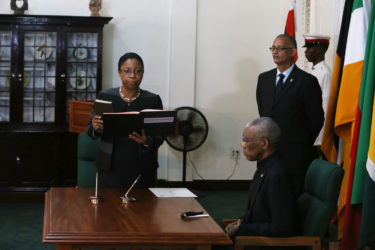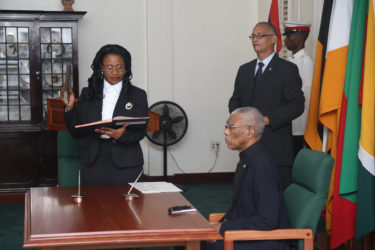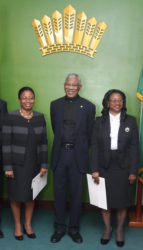Acting Chancellor of the Judiciary Yonette Cummings-Edwards and acting Chief Justice Roxane George were both sworn-in yesterday and President David Granger signalled that he will finally move to appoint judges soon to address the shortage in the judiciary.
“There is a shortage and we are moving quickly with the Chancellor and the Chief Justice, who have been installed, to have the Court of Appeal constituted; to have the Judicial Service Commission (JSC) meet to make recommendations and fill the vacancies as soon as possible,” Granger told reporters following the swearing in ceremony at State House yesterday.
In January, the government invited applications by persons interested in serving as Chancellor and Chief Justice. It is unclear if the government acted on the responses it received. However, under Article 127(1) of the Constitution, the President needs to obtain the agreement of the opposition leader to appoint both office holders.


Following a meeting between Granger and Opposition Leader Bharrat Jagdeo, both Justices Cummings-Edwards and Wiltshire were appointed by the President to act in the respective posts on March 1. Last week, attorney and PPP parliamentarian Anil Nandlall had pointed out that although the President had stressed the urgency in filling the two posts—after the retirement of both acting Chancellor Carl Singh and appellate judge BS Roy—three weeks had passed without him moving to swear them in, resulting in the Court of Appeal being non-functional. “The impact that this nonfunctional court is having on the justice system, the backlog of cases and the constitutional rights of litigants to have a court ready and able to hear their legal grievances is catastrophic,” he had said, while adding that this situation can affect lawyers’ ability to file matters in the Caribbean Court of Justice (CCJ) as leave has to be first granted by the Court of Appeal.

The President was asked yesterday about the concerns. “I am confident that the new Chancellor is aware of the shortages and as quickly as the JSC could meet and submit to me, I would move ahead. I have no interest in perpetuating a situation in where there are insufficient judges. The backlog is being built up and the swearing in of the Chancellor and Chief justice is a step in the right direction,” he asserted. “So I expect that as soon as the JSC makes its recommendations I will be able to give approval and move ahead. I think the crisis …will resolve itself in a few days or weeks,” he added.
In May last year, the JSC, under the chairmanship of Singh, had submitted a list of four nominees—two for the Court of Appeal and two for the High Court—to President Granger but he did not act on the recommendations.
Article 128(1) of the Constitution provides that judges, other than the Chancellor and Chief Justice, are appointed by the President “who shall act in accordance with the advice of the Judicial Service Commission.” Article 128(2) also provides that “the President shall act in accordance with the advice of the Judicial Service Commission and appoint a person to act in the office of Justice of Appeal or Puisne Judge, as the case may be.”
The President informed yesterday that he had received some names for appointments from the JSC but had withheld approval pending the review and advice of the new Chancellor. “I withheld approval because I sent the recommendations to the present Chancellor, who has agreed to look at them and resubmit a list to me. As soon as I get that list, I will be able to act. So I did decline. I saw the list, and I received some information, and on the [basis] of that information, I sent it to the present Chancellor and I am awaiting her advice,” Granger said.
For her part, Cummings-Edwards said that addressing the shortage of judges was key on her agenda and that a meeting of the JSC will be convened shortly. She explained that the full complement of the Court of Appeal is five justices, while three are required to hear appeals on the Bench.
Attorneys who spoke with Stabroek News had also criticised Singh for failing to bring the judiciary up to strength.
One attorney, who did not want to be named, stressed that following the departure of Justice Desiree Bernard from the office of the Chancellor, there were many vacancies across the entire judiciary but when Justice Singh took office he did not take steps to rectify the situation.
Stating that the “judiciary was run into the drain,” the attorney noted that Justice Singh started appointing temporary magistrates and it was only when he was on the verge of retirement that they were confirmed. This would have been about two years after they were appointed.
It was made clear that the JSC, which had the authority, made no efforts to fill gaps in the judiciary and this has now resulted in a huge backlog of cases.
The attorney, in part, blamed this on the administrative flaws existing in the judiciary. It was pointed out that the JSC in 2016 only met on two occasions. “The JSC is like a Cabinet. The Cabinet is an important component of the executive and it meets once a week but yet we have the JSC which is so important for the judiciary meeting twice in a year,” he said.




